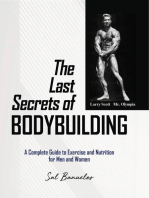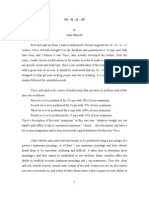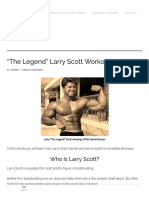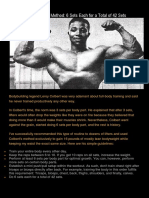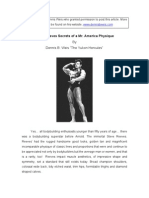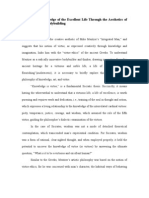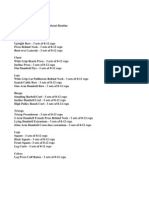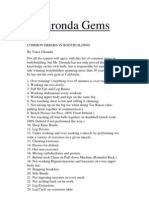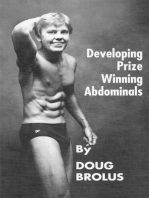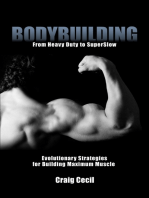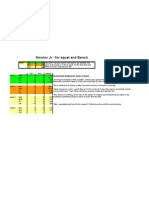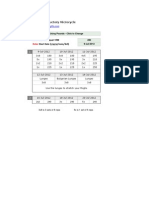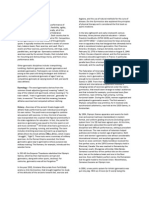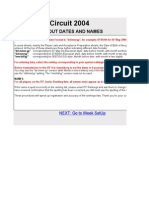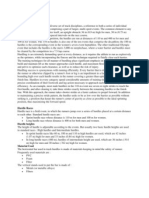Reg Park
Reg Park
Uploaded by
Steve MessengerCopyright:
Available Formats
Reg Park
Reg Park
Uploaded by
Steve MessengerCopyright
Available Formats
Share this document
Did you find this document useful?
Is this content inappropriate?
Copyright:
Available Formats
Reg Park
Reg Park
Uploaded by
Steve MessengerCopyright:
Available Formats
Reg Park's 5x5 Program
The Original Strength and Size Routine by the Editors
Below are 2 articles about the original 5x5 program as developed by bodybuilding great Reg Park. He got big and strong in the pre-steroid era of strength training. Give it a look. The original routine is a little on the long and tiring side but it can be adapted to fit your level of training and schedulethat is why I included Mike Mahlers article as well. Enjoy! --JT
As far as the popularity of beginner's training programs go, five sets of five reps is right up there with 3x10, 10x3, and the ever-lasting 1x20 squat program, which inspired the weight room battle-cry, "Squats and milk!" A few years ago, Dan John wrote an in-depth explanation of several versions of the 5x5 program. Bill Starr also created a popular 5x5 plan that focused primarily on the power clean, bench press, and back squat. We're going to take a look at one of the very first 5x5 routines to be published, originally written in 1960 by Reg Park in his manual Strength & Bulk Training for Weight Lifters and Body Builders. The late Reg Park was a threetime Mr. Universe winner and he was one of the first bodybuilders to really push the size envelope by competing at a massive 225 pounds in the 1950s and '60s. Oh yeah, Park is also the number one bodybuilder that little Arnie from Austria admired, respected, and hoped to someday look like. Upon seeing Park on a magazine cover for the first time, Schwarzenegger has said, "He was so powerful and rugged-looking that I decided right then and there I wanted to be a bodybuilder, another Reg Park."
Reg Park's Three Phase 5x5 Program Phase One 45-degree back extension 3x10 Back squat 5x5 Bench press 5x5 Deadlift 5x5 Rest 3-5 minutes between the last 3 sets of each exercise. Train three days per week for three months.
Phase Two for Bodybuilders* 45-degree back extension 3-4x10 Front squat 5x5 Back squat 5x5 Bench press 5x5 Standing barbell shoulder press 5x5 High pull 5x5 Deadlift 5x5 Standing barbell calf raise 5x25 Rest 2 minutes between sets. Train three days per week for three months. * After the basic Phase One, Park had a different set of recommended exercises for aspiring Olympic weightlifters. It used a few different sets and reps, and included lunges and power cleans.
Phase Three for Bodybuilders 45-degree back extension 4x10 Front squat 5x5 Back squat 5x5 Standing barbell shoulder press 5x5 Bench press 5x5 Bent-over barbell row 5x5 Deadlift 5x3 Behind-the-neck press or one-arm dumbbell press 5x5 Barbell curl 5x5 Lying triceps extension 5x8 Standing barbell calf raise 5x25 Rest 2 minutes between sets. Train three days per week for three months.
As Park explained it, 5x5 includes two progressively heavier warm-up sets and three sets at the same weight. He suggested increasing weights at approximately the same interval, for example: Back squat: first set 135x5, second set 185x5, followed by three sets of 225x5.
When you can complete the last 3x5 at a given weight, increase the weight on all five sets 5-10 pounds. Also, he was strongly against training to failure, saying that it encouraged a negative mindset when attempting other heavy, near-maximal lifts. You are, however, allowed to test for one-rep max at the end of each phase. Park recommends two warm-up sets (1x5 and 1x3), followed by three progressively heavier attempts at a one-rep max. So the max testing day would be: 1x5, 1x3, and 3x1 (for each lift). Take the next four days off from the gym, and then begin the next phase of training. For the 45-degree back extensions, begin without added weight. Once you can complete all sets, increase your poundage each set while still getting all sets and reps. Park and his training partner often used 135 for the first set, 175 for the second, and 215 for the third, and 235-255 for the fourth. That's the entire plan, and it's a doozy. Talk about volume training? Mike Mentzer just rolled over in his grave... once. Notice, there really aren't any isolation exercises until the third phase, when you've been training consistently for six months. Only then can you break out some curls for the girls. As far as recovery goes, Park recommended plenty of sleep and plenty of food. His main sources of nutrition would include whole milk, whole eggs, steak, orange juice, salad, protein powders, wheat germ, and liver tablets. Interestingly, the foods would remain the same when cutting, but the portions would be reduced. With such a high volume of work, it wasn't uncommon for these workouts to last two to three hours. That's typical of the training in that era, and it's a far cry from the, "get out of the gym in 60 minutes, or you'll sacrifice growth hormone levels!" warnings of today. Does that make it much worse than programs designed today? Is this absurdly busy training day dangerous, guaranteed to break you emotionally and scare you out of the gym? Not necessarily. While it might not be ideal, or even fun, to do for the long term, when was the last time you had a juggernaut session and really tried to destroy yourself in the gym? Once in a while, it's okay to break the rules, especially if you have a free Saturday with nothing else to do... and a free Sunday to lie in bed, eat steak, and curse us for daring you to try this plan.
The Reg Park Way To Serious Size And Strength
by Mike Mahler
"Training is like life, you get your ups and downs, but if you think about your problems hard enough and logically enough, you'll either solve them or reach a compromise." Reg Park
If your goal is to develop a powerful physique that is every bit as strong as it looks, you can't do much better than to follow the example of three time Mr. Universe, Reg Park. Arnold Schwarzenegger often refers to Reg Park as his childhood idol and the greatest inspiration and influence on his own bodybuilding and life successes. In this article we'll take a closer look at Reg's training philosophy and cover his very popular and highly effective 5x5 program as well. Even if you don't care about getting bigger, if you want to develop a lean and strong physique, Reg is the man to emulate.
Rule #1: If you want to get bigger, then get stronger Many people training today separate hypertrophy training from strength training. They think that when focusing on getting bigger, one should focus on the muscle not how much weight one is using. This explains why today's bodybuilders are nowhere near as strong as the old school bodybuilders like Reg Park. Reg didn't separate strength training from bodybuilding. He believed that in order to get bigger, you must get stronger. Heavy weight training equals more recruited muscle fibers, which equals more
muscular growth. The only difference, says Reg, is that the pure strength trainer shouldn't increase caloric intake to avoid putting on size, while the bodybuilder should ramp up high quality nutrition in order to pack on more size.
Rule #2: Focus on compound movements Reg believed in spending time on exercises that produce the maximum return. The cornerstone of his training was a healthy diet of squats, deadlifts, and bench presses, which he called the primary strength exercises. Secondary or supplementary exercises were cleans, high pulls, and clean and presses. Personally, I'd replace the bench press with the standing military press, and throw in some pull-ups or bent over rows to balance the upper body. Regardless, Reg knew what he was doing, and had the results to back it up. Most trainees won't go wrong with a focus on the three primary lifts. Once you get your bench up to 300 pounds, and your squat and deadlift up to 400 pounds, you'll notice a big difference in how your physique looks. The result of a healthy diet of squats, deadlifts, and bench presses. If you don't want to get bigger, just keep your calories in check. For most trainees, worrying about getting too big is like worrying about making too much money. There are better problems to focus your attention on. Build a strong foundation on the three primary exercises, then add some supplementary exercises to round out your program and keep progress coming.
Rule #3 Don't let your lower back hold you back If you've ever had a lower back injury, you know how important the lower back is to overall strength and power. We generate a lot of power from our backs and just because we can't see it in the mirror doesn't mean that it's not important. Many trainees avoid doing any direct lower back work, because they don't want to strain their back. Then, ironically, they get lower back pains. The bottom line is if you have a weak back, you have a weak body. To avoid lower back pain and to build a strong and powerful physique, Reg believed that all training should include prone hyperextensions to keep the lower back strong and healthy. Most gyms have hyperextension equipment, and if you're lucky your gym has Louie Simmons' reverse hyper machine. Start with a couple sets of ten with your bodyweight and then start adding weight. Progress slowly and carefully. You're not trying to set a PR on the hyperextension by seeing how much weight you can use for one rep, you're using it as a preventive measure to avoid lower back injuries and keep your back strong and healthy.
The Louie Simmons reverse hyperextension machine After a few weeks of lower back work, don't be surprised if you notice a strength increase on overhead presses, deadlifts, and squats. Especially if you haven't done any direct lower back before.
Rule 4: Confidence is critical for increased size and strength According to Reg, an effective training program focuses on increasing confidence. You should feel strong, empowered, and ready to take on the world after each workout. If you feel weak and defeated, then you're doing something wrong. Imagine having a job in which you progressively work harder each month to make the same amount of money. Most people would find this absurd, and change jobs. Working smart means making more money for the same amount of effort, or better yet, working less and making more. Training is no different. Rather than going overboard and burning out, focus on the minimum training dose that'll produce the maximum result. You can always add more if necessary. Reg also believed that training to failure too often is a big mistake. If you train to failure too often, and miss a lot of lifts, your confidence will plummet, and so will your strength and size. Gradual progression is the way to go rather than having the illusion that strength and size will come in leaps and bounds. Have a long-term approach and enjoy the process.
Rule 5: You must know yourself to get the most out of training Reg was a big believer in self-analysis. You must take the time to find out who you are, and what you're capable of. He stated that if you worry a lot, then you'll find great benefit from training, as it'll help
remove stress, and help you get a better handle on your life. You learn a lot about yourself through training that can help you in other areas of your life. Trainees who make the mistake of compartmentalizing their training lives from the rest of their lives miss out on these lessons. We learn the power of discipline, perseverance, patience, and hard work from training. Carry over these skills into your business or job, and you'll benefit tremendously. If you're strong in the gym but weak in your personal and professional life, then you're weak overall. Carry over what you've learned from effective training to other areas of your life and you'll experience the full benefits of training.
Rule 6: Layoffs and restoration are critical We live in a workaholic society, in which we think that more is better across the board. We feel it's critical to work longer hours to get ahead and make more money, thinking that we will be much happier only to want more after we make more. Many serious trainees take this workaholic mentality into the training realm, not only training far too often, but also not recovering enough. The idea of taking an entire week off would be unthinkable to them. Regardless, training must be balanced with adequate recovery. Reg believed that layoffs are important to build up reserves, and to allow the body to rest. Moreover, when you take some time away from training you can't wait to get back at it and have a renewed enthusiasm to push forward. Just as it is beneficial to take time off from work and enjoy a vacation it is critical to take a training vacation periodically. When you take a layoff, don't even think about training. Immerse yourself in other activities and enjoy the time away from working out. Don't read training books and magazines all day and analyze your workouts. A mental break is just as important as a physical break. Get a relaxation massage at the beginning of your layoff. Many trainees always ask for a deep tissue massage no matter what, but this generic approach isn't the way to go. Find a high quality bodyworker who can give you a personalized massage based on the state you're in. He or she will know what you need.
Rule 7: Start reaping the benefits of the 5x5 program Most people think they know all about the 5x5 program, Reg's favorite strategy for packing on strength and size. Just pick a weight and use it for five sets. When you can do five reps on all five sets, add weight. Don't increase the weight until you can do five reps for all five sets. This allows for a gradual progression and an avoidance of burning out. Simple, right? Yes, but this isn't the 5x5 version that Reg used and recommended. In Reg's 5x5 program, the first two sets are warm-ups, and the last three are the primary work sets. For example, if you're using 200 pounds for the primary sets on the military press, it would look like this: 160 x 5, 180 x 5, 200 x 3 x 5. When you can use 200 pounds for the last three sets of five, increase the poundage by five pounds on all five sets to take it to 165 x 5, 185 x 5, 205 x 3x5. Reg referred to the three primary sets as the stabilizer sets.
When you can do a given weight for three sets of five, you've locked that weight in, and are ready to move up. You can start with lighter weights for the first two warm-up sets, but make sure the poundage jumps from the first to the second set and from the second to the third set are the same. The first two sets are confidence-builders. Thus, if you feel tired on the first confidence-building sets, do one or two more to build up reassurance to attack the three primary sets. Unlike many of today's bodybuilders that take very short breaks in between each set, Reg recommended 3-5 minute breaks to recover fully from each set. Also, focus on using as much weight as possible for each set, to acquire the greatest return on your effort.
Reg Park-Inspired 5x5 Programs Option 1: (Two sessions per week, for busy people or trainees with poor recovery) Monday Hyperextensions 3x10 (one minute breaks) A1) Standing barbell military press 5x5 A2) Barbell bent-over row 5x5 Take two-minute breaks in between each set of A1 and A2. Go back and forth until all of the sets have been completed. Barbell squat 5x5 (three minute breaks in between each set) Thursday Hyperextensions 3x10 (one minute breaks) A1) Weighted dip 5x5 A2) Weighted pull-up 5x5 Take two-minute breaks in between each set of A1 and A2. Go back and forth until all of the sets have been completed. Barbell deadlift 5x5 (three minute breaks in between each set)
Option 2: (three sessions per week, for trainees who have more time and adequate recovery) Monday Hyperextensions 3x10 (one minute breaks)
A1) Standing barbell military press 5x5 A2) Barbell bent-over row 5x5 Take two-minute breaks in between each set of A1 and A2. Go back and forth until all of the sets have been completed. Barbell squat 5x5 (three minute breaks in between each set) Wednesday Hyperextensions 3x10 (one minute breaks) A1) Weighted dip 5x5 A2) Weighted pull-up 5x5 Take two-minute breaks in between each set of A1 and A2. Repeat until all of the sets have been completed. Barbell deadlift 5x5 (three minute breaks in between each set) Friday Hyperextensions 3x10 (one minute breaks) A1) Incline barbell press 5x5 A2) Dumbbell renegade row 5x5 Take two-minute breaks in between each set of A1 and A2. Repeat until all of the sets have been completed. Barbell squat 5x5 (three minute breaks in between each set)
Option 3: (3x per week for advanced trainees who have great recovery abilities) Monday Hyperextensions 3x10 (one minute breaks) Barbell military press 5x5 Weighted pull-ups 5x5 Barbell squat 5x5 Romanian deadlift 5x5 Barbell curl 2x5 Close-grip bench press 2x5 Calf raise 3x12
Wednesday Hyperextensions 3x10 (one minute breaks) Bench press 5x5 Barbell bent-over row 5x5 Power clean 5x3 Barbell deadlift 5x5 Dumbbell curl 2x5 Weighted dip 2x5 Calf Raise 3x12 Friday Hyperextensions 3x10 (one minute breaks) Dumbbell clean and press 5x5 Weighted pull-up 5x5 Barbell squat 5x5 Dumbbell lunge 5x5 Barbell curl 2x5 Close-grip bench press 2x5 Calf raise 3x12 Take one-minute breaks in between each exercise and three-minute breaks in between each set. For more information on Reg Park, check out his booklet Strength and Bulk Training for Weightlifters and Bodybuilders, available at Super Strength Training. Also, check out the official Reg Park website.
About the author Mike Mahler is a strength coach and fitness information provider based in Las Vegas. Sign up for his free online fitness magazine at his website.
You might also like
- Be Your Own Bodybuilding Coach: A Reference Guide For Year-Round Bodybuilding SuccessFrom EverandBe Your Own Bodybuilding Coach: A Reference Guide For Year-Round Bodybuilding SuccessRating: 5 out of 5 stars5/5 (6)
- Sergio Oliva, The MythDocument5 pagesSergio Oliva, The Mythlunn33% (3)
- Franco Columbus Complete Book of Bodybuilding by Franco Columbu PDFDocument7 pagesFranco Columbus Complete Book of Bodybuilding by Franco Columbu PDFnitesh soni0% (2)
- Ray Mentzer - Max - RepDocument2 pagesRay Mentzer - Max - RepIt's Just Me50% (2)
- Vince Gironda 10-8-6-15Document31 pagesVince Gironda 10-8-6-15Snake Diet Ryan100% (10)
- The Greatest Silver Era Bodybuilding Programs FinalDocument128 pagesThe Greatest Silver Era Bodybuilding Programs FinalCarlos Mendez100% (7)
- If You Like Exercise … Chances Are You’Re Doing It Wrong: Proper Strength Training for Maximum ResultsFrom EverandIf You Like Exercise … Chances Are You’Re Doing It Wrong: Proper Strength Training for Maximum ResultsRating: 4.5 out of 5 stars4.5/5 (7)
- Golden Six PDFDocument7 pagesGolden Six PDFMadalin Cristian Soare100% (1)
- Phil Hernon TrainingDocument2 pagesPhil Hernon TrainingWepo88% (8)
- 10 - 8 - 6 - 15 ArticleDocument5 pages10 - 8 - 6 - 15 Articlelsalese100% (2)
- Vince Gironda - Training SecretsDocument0 pagesVince Gironda - Training Secretsbillmeek100% (2)
- The Legend - Larry Scott Workout and Diet Iron & GritDocument15 pagesThe Legend - Larry Scott Workout and Diet Iron & GritAtharva100% (4)
- Mr. Germany, Mr. Europe, Mr. Universe And Mr. America Ben Huellen Raw, The Good, The Bad And Certainly The Ugly.From EverandMr. Germany, Mr. Europe, Mr. Universe And Mr. America Ben Huellen Raw, The Good, The Bad And Certainly The Ugly.No ratings yet
- Mad Scientist Muscle: Build ''Monster'' Mass With Science-Based TrainingFrom EverandMad Scientist Muscle: Build ''Monster'' Mass With Science-Based TrainingRating: 3 out of 5 stars3/5 (5)
- Physics of GymnasticsDocument8 pagesPhysics of Gymnasticsmszjeminibooc694No ratings yet
- Pro One PracticeDocument4 pagesPro One Practicemr_n_man75% (4)
- Training ProgramDocument3 pagesTraining Programhariso1995100% (1)
- How Steve Reeves Trained by John GrimekDocument2 pagesHow Steve Reeves Trained by John GrimekNadia Chauhan67% (9)
- Steve Reeves Secrets of A Mr. America Physique by Dennis WeisDocument17 pagesSteve Reeves Secrets of A Mr. America Physique by Dennis WeisMujahid Islam90% (10)
- Larry Scott ArticleDocument14 pagesLarry Scott Articlefnandow4lNo ratings yet
- 50s Bodybuilders RoutinesDocument7 pages50s Bodybuilders Routineschris_blair_183% (6)
- Your Key To Broad Shoulders - Bill Pearl (1965)Document11 pagesYour Key To Broad Shoulders - Bill Pearl (1965)Frank100% (4)
- Merda SeccaDocument25 pagesMerda Seccamothafukka100% (5)
- Oldschool Bodybuilding 2nd Edition 129Document129 pagesOldschool Bodybuilding 2nd Edition 129fatmir100% (8)
- Vince Gironda 8x8 RoutineDocument10 pagesVince Gironda 8x8 RoutineCLAVDIVS33% (3)
- Reg Park 5x5 2Document2 pagesReg Park 5x5 2Murilo AlmeidaNo ratings yet
- Larry Scott in IronManDocument12 pagesLarry Scott in IronManBobbo Fett100% (2)
- Steeve ReevesDocument8 pagesSteeve Reevestoneranger100% (2)
- Sergio Training RoutineDocument5 pagesSergio Training RoutineCALFNo ratings yet
- Mike MentzerDocument12 pagesMike Mentzerbrian anderson100% (2)
- Reg Park - A Hercules For Our TimeDocument16 pagesReg Park - A Hercules For Our TimeTim Donahey100% (2)
- Hard Gainers Bible Bradley SteinerDocument41 pagesHard Gainers Bible Bradley Steinerpopeyeballina100% (12)
- DoggcrappDocument8 pagesDoggcrappandrea90bragaNo ratings yet
- Reeves RoutineDocument1 pageReeves Routinecabuonav100% (2)
- Larry Scott ArmsDocument7 pagesLarry Scott ArmsCALFNo ratings yet
- All About Doggcrapp and DC TrainingDocument21 pagesAll About Doggcrapp and DC TrainingAnderson Abel SaradonNo ratings yet
- Don Howorth Mr. DeltsDocument12 pagesDon Howorth Mr. DeltsMGS Argentum100% (1)
- Casey Viator TrainingDocument4 pagesCasey Viator Trainingbamabob1100% (2)
- Gironda GemsDocument135 pagesGironda Gemsmibosan100% (3)
- Doggcrapp TrainingDocument8 pagesDoggcrapp TrainingGaurav PokhriyalNo ratings yet
- Kris Gethin' S DTP ExplainedDocument7 pagesKris Gethin' S DTP ExplainedBasel Bulbul100% (1)
- 15 Things I Learned From Sergio Oliva SRDocument6 pages15 Things I Learned From Sergio Oliva SRFabiano Lacerda100% (2)
- Ironguru Blueprint For The Bodybuilder PDFDocument20 pagesIronguru Blueprint For The Bodybuilder PDFSnake Diet Ryan100% (2)
- Atomic Fitness: The Alternative to Drugs, Steroids, Wacky Diets, and Everything Else That's FailedFrom EverandAtomic Fitness: The Alternative to Drugs, Steroids, Wacky Diets, and Everything Else That's FailedNo ratings yet
- Old School Bodybuilding: Training With the LegendsFrom EverandOld School Bodybuilding: Training With the LegendsRating: 4.5 out of 5 stars4.5/5 (11)
- Optimum Fitness: How to Use Your Muscles as Peripheral Hearts to Achieve Optimum Muscular and Aerobic FitnessFrom EverandOptimum Fitness: How to Use Your Muscles as Peripheral Hearts to Achieve Optimum Muscular and Aerobic FitnessNo ratings yet
- Bodybuilding: From Heavy Duty to SuperSlowFrom EverandBodybuilding: From Heavy Duty to SuperSlowRating: 4.5 out of 5 stars4.5/5 (17)
- Calorie & Macronutrient Calculator, MenDocument8 pagesCalorie & Macronutrient Calculator, MenSteve MessengerNo ratings yet
- Nomenclature PrioritiesDocument1 pageNomenclature PrioritiesSteve MessengerNo ratings yet
- Understanding Organic ReactionsDocument4 pagesUnderstanding Organic ReactionsSteve Messenger100% (1)
- Cry AgonyDocument1 pageCry AgonySteve MessengerNo ratings yet
- The Basics - A Really Useful CookbookDocument587 pagesThe Basics - A Really Useful CookbookSteve Messenger100% (13)
- Smolov JRDocument1 pageSmolov JRMike GarciaNo ratings yet
- Smolov Squat ProgramDocument4 pagesSmolov Squat ProgramSteve Messenger100% (1)
- The Ultimate List of All Judo TechniquesDocument4 pagesThe Ultimate List of All Judo TechniquesGilcerto Alves100% (1)
- GymnasticsDocument3 pagesGymnasticsBhi Gail UrayenzaNo ratings yet
- Tiger Time 3 U3 Test 1 PDFDocument7 pagesTiger Time 3 U3 Test 1 PDFAnonymous 8ASL4WNo ratings yet
- TriathlonDocument2 pagesTriathlonOvalle Ojeda MaricelNo ratings yet
- Nutan Buddhibal Mandal: 53Rd Sangli Chess Festival-2022Document1 pageNutan Buddhibal Mandal: 53Rd Sangli Chess Festival-2022Digvijay TembhareNo ratings yet
- Wendler 5-3-1 v1.28 by PotetoDocument38 pagesWendler 5-3-1 v1.28 by PotetoAndre AmadoNo ratings yet
- 9SSKC2024 - Winners ListDocument7 pages9SSKC2024 - Winners Listmhyrilash0712No ratings yet
- 310 2017 Second Session of Sporting Commissions Meeting in Fiumicino ItalyDocument6 pages310 2017 Second Session of Sporting Commissions Meeting in Fiumicino ItalyАлексей ПолянцевNo ratings yet
- July 20 - 26, 2016 Sports ReporterDocument8 pagesJuly 20 - 26, 2016 Sports ReporterSportsReporterNo ratings yet
- The History of Skateboarding in Less Than 1700 WordsDocument2 pagesThe History of Skateboarding in Less Than 1700 WordsEugen CuțicNo ratings yet
- 2019 June Chronicle AICFDocument27 pages2019 June Chronicle AICFRam KrishnaNo ratings yet
- 2017 AllComers Meet 5 ResultsDocument4 pages2017 AllComers Meet 5 ResultsrfergusonNo ratings yet
- Fundamental Skills of ArnisDocument5 pagesFundamental Skills of ArnisJay1 PlaysNo ratings yet
- Types of TKD CompetitionsDocument12 pagesTypes of TKD CompetitionsJairo Angel EvaristoNo ratings yet
- UK 8 Ball Pool - WrulesDocument7 pagesUK 8 Ball Pool - WrulesMuhamad Noor ChikNo ratings yet
- Taekwondo Quiz Answer KeyDocument11 pagesTaekwondo Quiz Answer KeyShefali TripathiNo ratings yet
- Roberto CoccoDocument7 pagesRoberto CoccoEl NoobNo ratings yet
- Qualifying Ipoh 2010 FinalDocument109 pagesQualifying Ipoh 2010 Finalzigong65No ratings yet
- Lillebridge MethodDocument5 pagesLillebridge Methodblutter846100% (1)
- David Laid Hypertrophy Routine Bibliotecaderutinas - Com.xlsx - David LaidDocument10 pagesDavid Laid Hypertrophy Routine Bibliotecaderutinas - Com.xlsx - David LaidScribdTranslationsNo ratings yet
- Bawla Southern Masters 2022 Results CombinedDocument3 pagesBawla Southern Masters 2022 Results Combinedapi-47824937100% (1)
- Canadian Aikido Federation Test RequirementsDocument4 pagesCanadian Aikido Federation Test RequirementsJulio CardenasNo ratings yet
- Hurdles (Sports Equipment)Document1 pageHurdles (Sports Equipment)PRINTDESK by Dan0% (1)
- Athletics 2014 RulesDocument2 pagesAthletics 2014 RulesChloe Ann Meren NavarroNo ratings yet
- How To Be A Good UkeDocument10 pagesHow To Be A Good UkeTrent Whicker100% (1)
- 10weekfattorcher PDFDocument1 page10weekfattorcher PDFAny nameNo ratings yet
- Lesson 3 Week 3Document18 pagesLesson 3 Week 3Nelson ManaloNo ratings yet
- Week Squat Session One Comp Squat HB Pause Squat Sets Reps Weight SetsDocument5 pagesWeek Squat Session One Comp Squat HB Pause Squat Sets Reps Weight SetsRob ReesNo ratings yet





